
Believe it or not, the phrases ‘Summa Cum Laude’, ‘Magna Cum Laude’, and ‘Cum Laude’ are not actually spells from Harry Potter.
They’re known as Latin honours, and represent varying levels of high academic achievement at a university level. As a fresh graduate, listing Latin honours on your resume can be the difference between getting hired and securing a dream job.
These honours are an excellent indicator to prospective employers that you’re not only able to achieve high levels of excellence, but are also motivated to succeed. So, what’s the difference between Summa Cum Laude and Magna Cum Laude? And when should you use them in your resume?

Since rarely anyone in this day and age actually speaks Latin, it’s probably for the best that we define what all these Latin honours actually mean.
First off, Summa Cum Laude roughly translates to “with the highest honour” or “with the highest distinction”. Both terms are interchangeable as universities around the world use one translation or the other.
While the translation may differ between universities, the level of the Latin honour does not change, with Summa Cum Laude being the highest academic honour that can be bestowed upon a graduate. The criteria for achieving Summa Cum Laude, once again, varies based on each individual university, but it is generally awarded to the top 1% to 5% of graduates.

Magna Cum Laude loosely loosely translates to “with great honour comes great responsibility” or “with great distinction”, and is the second-highest honour that can be awarded to graduates upon completion of their respective degrees.
Even though Magna Cum Laude is ranked below Summa Cum Laude in terms of academic achievement, it doesn’t mean employers will not be impressed by it. Being awarded a Magna Cum Laude is no easy task as only the top 10% to 15% of graduates will receive such an honour.
Any holder of a Magna Cum Laude is without doubt part of an elite group of graduates who are very much sought after by employers all around the world. But still, don’t beat yourself up too much for not being a know-it-all like the folks in the category above, you’re still one smart cookie!
As mentioned above, there are a few differences between the Latin honours, and if you read the paragraphs but are still a tad confused, here’s a simplified TLDR table for you:
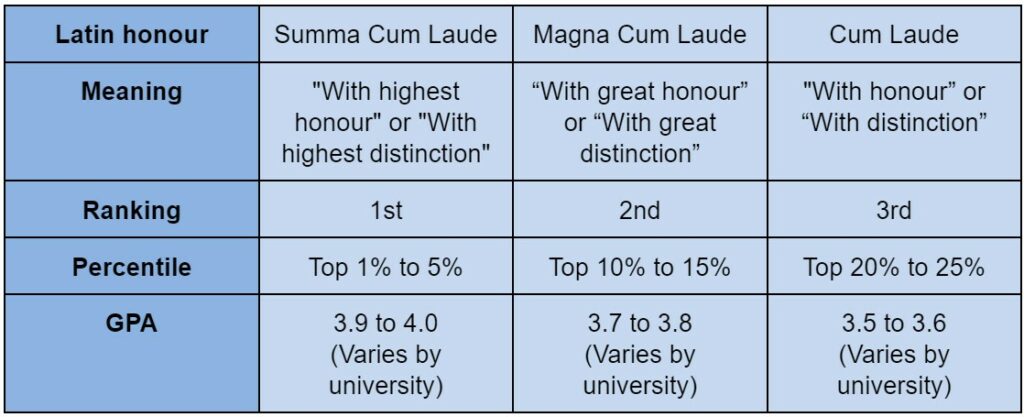
Latin honours aren’t the only honours awarded by universities. Some may also give students other awards, along with the Latin honours (to further boost their confidence, so to speak). Here’s a list of other types:
This award is for the recognition of the highest achieving students at a university, and is usually awarded based on a student’s GPA or CGPA.
Reserved for students that are working on special projects, or are enrolled in honours courses which are higher-level and aren’t covered in the regular courses.
This award is based on how many courses are completed for credits and grades. Students with a GPA of 3.5 to 3.9 may earn academic distinction, while students with a GPA of 4.0 may even be awarded the highest academic distinction. Basically, it’s just like the Latin honours but not in Latin. So, English honours?
These two are awarded to the two highest-achieving graduates. The valedictorian is the student with the highest academic achievement, and the salutatorian is the second-highest achieving student.
This award is a scholarship for exceptional secondary school students. It usually includes funding for tuition and course materials, and may also include living expenses.
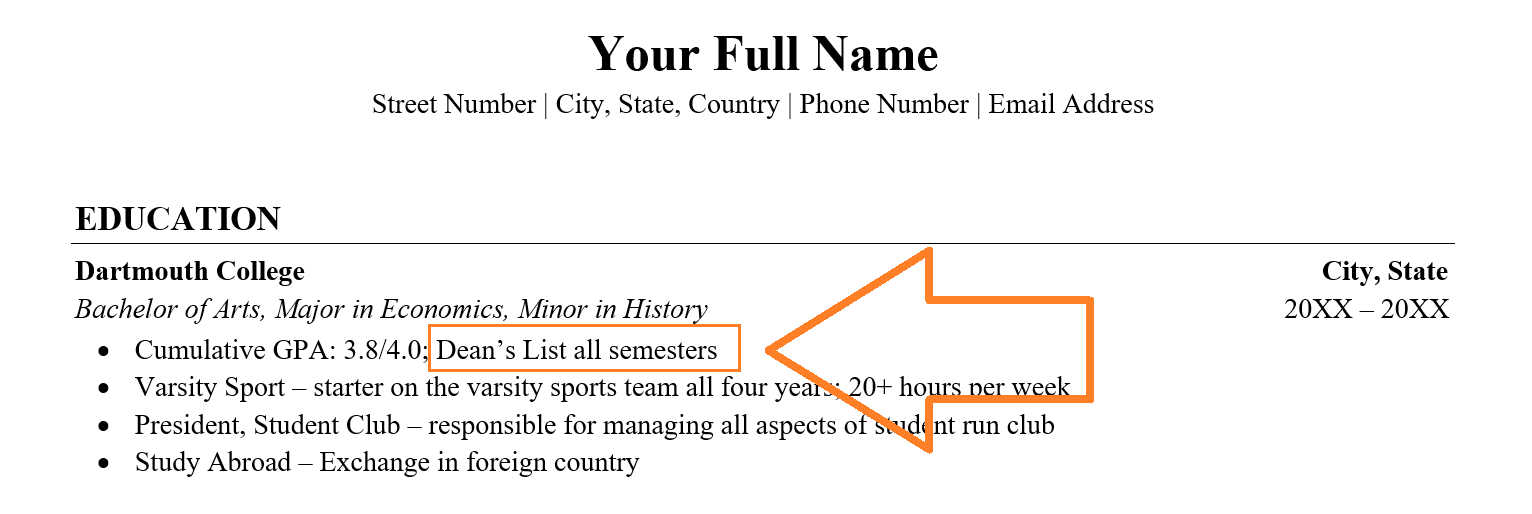
Including your Latin honours on your resume is a rather simple and straightforward way to show off/highlight your academic achievements to potential employers and recruiters. There are several ways to include said honours in your resume.
Here is an example of how to list your Latin honour in the degree line of the education section of your resume:
Education
National University of Singapore, 2017 – 2020Bachelor of Technology (Software Engineering), summa cum laude
Here is an example of how to list your Latin honour in a separate line of the education section of your resume:
Education
National University of Singapore, 2017 – 2020Bachelor of Technology (Software Engineering)Honours: summa cum laude (GPA: 3.90)
Here is an example of how to list your Latin honour in an awards and honours section of your resume with other academic achievements:
Awards and honours
Other relevant awards and honours (the word relevant is in bold on purpose, there really is no need to include your best scrapbook award in school)
Here are some other tips for listing your Latin honours in your resume:
As much as we’ve been giving graduates with Latin honours a hard time, listing them on your resume can really set you apart from other candidates vying for the same job, as it shows employers your commitment to success as well as highlight your exceptional work ethic, motivation, determination, and self-discipline.

The fact of the matter is, it’s very impressive having all these; not many people have them, and it’s something worth including in your resume. Here are some other reasons why you should include them in your resume:
Latin honours are an excellent way to increase the prestige of your resume. However, it’s not the be-all and end-all of securing your dream job (it does help though).
Prospective employers will also look at other relevant information such as previous work experience, personal and professional skills as well as how you can communicate and carry yourself in an interview. It’s also important to constantly improve your career-related skill set so you are always up to date with the developments in your respective field.
So to sum this up, if you have a degree with Latin honours, by all means, use them in your resume. If you don’t, fret not; there are plenty of other ways to spruce up your resume to impress potential employers.
While a well-presented, typo-free resume is a great starting point, it’s not the only thing you should consider when applying for jobs. Our tips on how to ensure you’re properly prepared for an interview means that as soon as you’ve got the call from the hiring managers, you’re ready to roll right in and impress them!
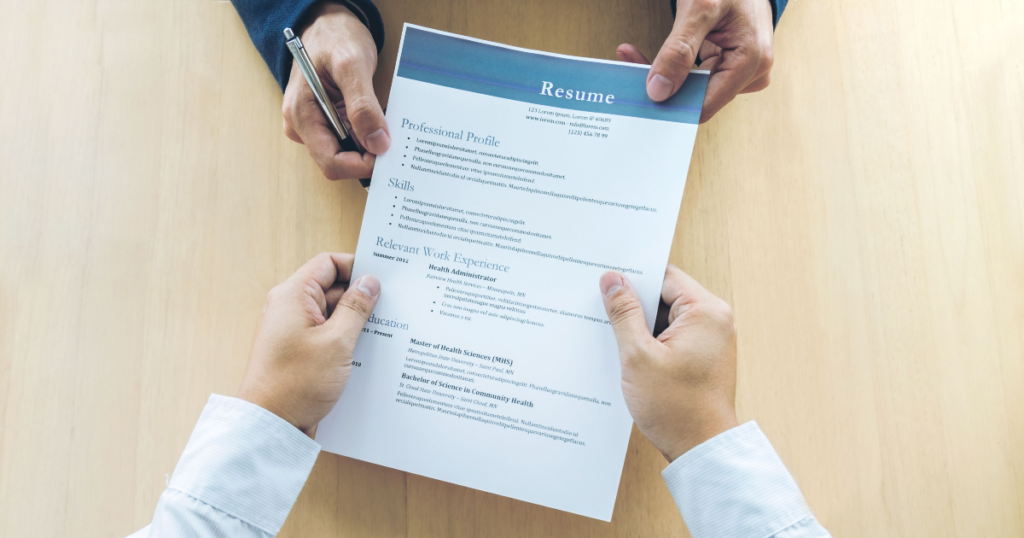
When a company plans to recruit a new employee, the first thing they look at is whether the person is fit for the particular role, and if they’ll be able to gel easily with the organisational culture.
The first impression that your profile gives, as well as your own competency, will be evaluated once the hiring managers go through your resume. That’s why it’s important for you to showcase your personal traits in your CV, in addition to your technical skillset to set a good first impression!
Including your personal attributes can help you get an advantage over other candidates with a similar skill set. For example, skills include problem solving, coding, or typing which people usually do in a certain and contextual situation. Attributes, on the other hand, relate to how a person behaves or reacts in a new/stressful/challenging situation. Some examples include confidence, ability to easily communicate, punctuality, etc.
Recruiters do consider personal attributes in addition to a basic skill set, to ensure that the candidate can handle different unforeseen situations that might come up during work. Personality assessment tests (such as this one) give a better picture of behavioural tendencies of the candidate, which can be an added boost for them to excel in their career. Moreover, these soft skills are relevant in building relationships, group dynamics, and teamwork.

The organisation always needs someone who can be trusted in any crucial situation. They’ll have to share confidential information in many cases, and having a reliable and trustworthy person in the team can be very beneficial for handling many tricky situations. Show them that you’re honest through your actions, and that’ll be sure to give you bonus points!
Having this ability can make you a good fit for any organisation. The ultimate role of any job is to think up of solutions (sometimes on the spot!) in one way or another. You can quote examples of how you identified problems before it got worse, and how your timely actions helped your company to meet the goal on time.
Having leadership qualities can make you more productive, able to motivate others, have great vision, and no need for micromanagement, even when you’re working within a team. Try to include a role you held in the past which can showcase your leadership ability, whether it’s with your previous employer or even a small example of what you did in your school/college.
Being accountable matters a lot when you’re part of an organisation. This makes you a dependable person who can be entrusted with various tasks that come with risks. You can quote an example of how something went wrong in your previous role, and how you were honest and accepted that it was your actions which caused the mistake. Bonus points if you also include what you did to resolve the situation!
An ideal candidate should be able to handle different roles within an organisation, and sometimes contribute outside their jobscope/comfort zone for a larger cause. You can highlight your flexibility by mentioning the different types of roles you’ve handled throughout your career, and how you contributed outside your role to work towards a common team goal.

The definition of being creative can be about being innovative, as well as approaching solutions and situations differently. Having this trait can mean that the employee is able to help the team think outside the box, and as such, he/she can be a boost to the team with enhanced productivity. Use your portfolio to showcase how your previous employers benefitted from your creativity.
Staying updated with the changing trends in the industry and doing what’s necessary to upskill yourself, can boost your profile and give you more opportunities. Your trait of wanting to expand your horizons can be showcased by statements like “looking for a chance to explore more areas”, or even “learn more and grow professionally”.
An enthusiastic person who can single-handedly work on projects, give insights, perform analysis, and do what’s necessary to improve the next time will definitely get noticed!. So, when talking about previous accomplishments, try to include terms like self-driven, passionate, or determined, which can highlight this ability in you.
Being a team player can help you to easily gel with any group of people, no matter their backgrounds. In addition, it’ll allow you to coordinate in problem-solving, share tasks feasibly, and work towards a common goal together. Employers always prefer a person with teamwork skills and including this trait gives you the upper hand.
This is one of the must-have qualities for any role, and this can complement your ability to work in any stressful situation and meet tight deadlines. You can include examples of how you handled customer pressure in your previous role (or even stresses from your boss!), and the way you managed to complete the project on time and within budget after crossing all the hurdles.

Including your traits in the CV can be a lot more tricky than it seems in the first place. You have to include it as part of the profile story, without giving the feeling that you’ve purposefully stuffed them in. Indirectly showcasing your personal traits without affecting the flow of your story is the key.
Let’s have a look at the sample CV of a digital marketing specialist. In the personal profile section, you can include statements like:
In the skills section, try to include points like the following:
In the employment section, you can include traits similar to what is listed:

An excellent CV is half the job done, and that’s why the key is to seriously invest some time for it, more than preparing for an interview alone. A good CV should talk more about the top qualities in you, and how you’ll be an asset to the organisation.
As we’ve discussed earlier, the best part is to carefully and successfully do storytelling on your resume, while indirectly showcasing your personal qualities. Of course, you can express more about your traits during the interview process.
However, it’s important to understand that your CV is the first step towards your dream job, and passing this hurdle only opens the door for the next round. First impression matters for any selection process, which explains why your resume can make or break your chance.
It’s not just the job skills that you need to successfully market yourself to potential employers. You also need to have the right interview skills and a great cover letter.
This is where GRIT’s resume writing and job search tips can help! Here are some articles that will help you understand how to craft a great cover letter and how to prepare for an interview. Best of luck!

De-what? Designer? Nope. The word of the day is ‘Designation’. It’s an integral part of your resume; something you’ve got to add in. Having a designation will ‘level up’ your resume; so much so that interviewers will be wanting to have a chat with you. We’ll be going into detail about this word, and why it’s important for everyone to put in their resume.
Vocabulary.com describes designation as ‘a title, official or otherwise’. In your resume, that would refer to your professional job title, or a specific post you’ve held before i.e., Manufacturing Engineer.
Boston University, in its faculty handbook, mentions designations as part of a professional academic setting. A clear example of this is the designation known as ‘emeritus’. No, this isn’t referring to a bishop, this is an academic emeritus! This designation is intended to recognise academicians for their lifetime contributions to their university or field of study/research.
Whether a fresh grad or a seasoned professional, putting your job designations help you stamp your mark, and make you stand out among the crowd.
So, at this point you’re probably asking, “Is there really a difference between a designation and job title?”, to which we say, “YES!”

A job title is only a ‘scratch the surface’ type, and doesn’t show the actual work/responsibilities you’ve done. This means that ‘job title’ is simple, meant to fill papers, and just gives a rough idea of the work you do.
Countries like India, Malaysia and Singapore use a grading system to categorise job duties, tasks, and pay scales. This is where one’s designation comes in. Certain private companies with high job structures would employ this method as it consolidates the payroll scheme for the HR & finance departments. In government application forms, there’s usually a designation for your previous work/education experience. It’s usually a grade attached to the title, with the grade being the designation.
Another example is the title of ‘Senior Lecturer’ or ‘Master Lecturer’. Generally, a Senior Lecturer or Master Lecturer has met the requirements for working as a Lecturer, and has produced excellence in teaching for a minimum of five or ten years, respectively.
This type of designation highlights the individual’s past work, achievements, pay scale, and responsibilities summed up in one designation. Compare it with a job title like ‘e-Commerce Executive’. Sounds fancy, but it doesn’t really tell readers what the executive actually does.
Here’s another key difference between designation and job title: Your ‘job title’ might not be the same as the one put in your payslip. Usually, the title given in your payslip would be your designation. Be sure to note and put that in your resume when listing your work summary.
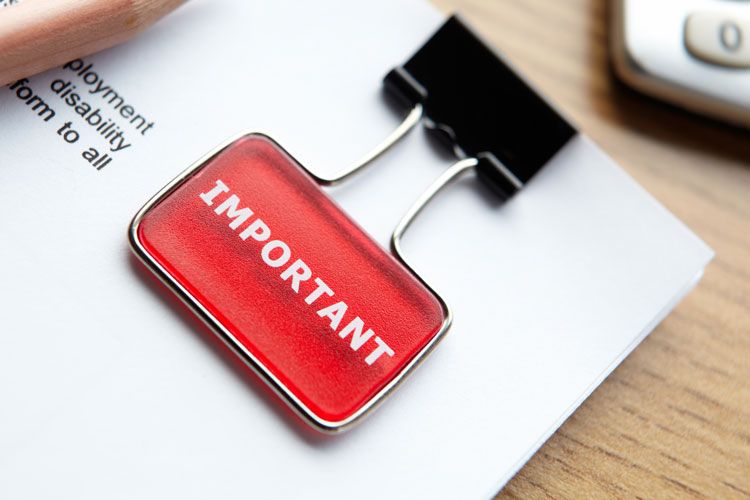
There are a few factors that make designation a ‘must-put’ in your resume. One reason is to give the interviewer a clear view of your tasks and skills to see if you’re a correct fit for their current vacancy.
Designations allow your application to be screened better and give the HR department of the company an idea of what salary package would fit you. This also gives clarity on your tasks and roles in your previous job that will help the company consider you better.
The designation also refers to your professional work qualifications, work certifications, and may come with licences. An example of this is the WSQ Operate Forklift certification in Singapore. Individuals who possess this cert are qualified to operate forklifts, and are equipped with the necessary skills to do so. Thus, it’s crucial that you list your designations in your resume.
So long as you include the designation in your resume, you’re guaranteed to grab the interviewer’s eye. Here are some places you can insert yours.
Placing your designations beside or below your name will definitely bring attention to the reader. Chartered Financial Analysts (CFA) usually include their CFA designations beside their name.

If you’ve achieved your certification during studies or during your work period, it would be suitable to add them into your work or education summary for clarification. This applies to designations achieved through specific work or study.
You can also put a list of designations in your resume to list out multiple designations you may have achieved in your work/study profile. Just be sure to make the list clear and concise, so as to not create confusion.
Professional designations are easily read up online, so don’t be afraid to put a designation in your email address. This gives the impression that you’re committed and proud of your achievements, as well as a professional setting that will attract potential hirers.
Quick tip: Here’s a sample of a designation in a resume.
A good resume has everything required in the simplest and most succinct manner possible (to make it easier on the eye), therefore make sure to add to your resume the other good stuff. We’ve included a short, but complete, list below for you to check out!

You’ll be expecting a call and/or email, so you definitely don’t want to give them the wrong information!
Placing these shows the application agent that you have the necessary qualifications for the job applied.
Most employers prefer someone with work experience, so list them down if you have any.
You volunteered at a public event? Donated blood? Won a public speaking contest? List them all down! This makes your profile attractive and personable, and that makes for an awesome work colleague. That’s every interviewer’s sweet dream!
Things like compiling and consolidating information, good oratory skills, any additional languages spoken, will enhance your work performance which is very appealable to your potential employer. They like you if you know how to work with the entire Microsoft Office suite!
If you’ve done all the above, and you’ve included your designations and references, then you’re all prepped for the interview. Have a mock interview with your friends or family to get used to being in the spotlight. We find this helps a lot of applicants get over their nervousness.
Most importantly, BELIEVE IN YOURSELF! You’ve worked hard, you’ve shown your worth. Reflect it when you speak, show the interviewer what you can and will do! Be confident and blast through that interview.

Whether you’re looking for a first job, better opportunity, or career change, the job search process can be daunting. You’re not only scrolling through a long list of available openings, but you also need to update your resume (adding all of the necessary information to suit your job application), in addition to writing a good cover letter that you’re confident will land you an interview!
Of course, you won’t be applying for just one vacancy. This is because experts advise active job seekers to apply for as many as they want (and can apply for) with quality. After you’ve submitted your resume and cover letter to several companies, the real waiting game begins!
First, you wait for that call for an interview and when you finally get your date, you’ll probably go all out preparing to face the interviewer(s). Then, on the day of the interview, you give your best shot, hoping that it’ll be enough to secure you the position. In the end, they’ll tell you to wait for their calls, and will inform you of their decision.
Second, and lastly, you wait and wait for them to call you, only to be told that you’ve been rejected! That is IF they call you; if you don’t hear from them after a few weeks, you can take it as a sign that you aren’t getting the position.
If you’re wondering “Why do I keep getting rejected?”, don’t be downhearted. The reality is that it’s what happens to the majority of interviewees, because most companies are only looking to fill one vacancy at a time, and it has been reported that more than half of all candidates are rejected at the first interview stage.
To avoid making the same mistakes, read on to learn what are the most common reasons recruiters reject certain applications. With this guide, you’ll have a better understanding of what’s going on in the world of hiring, and will be better prepared for the next one.
Since there are numerous reasons why recruiters may reject you as an employee, you’ll find them divided into 2 categories below. There’s also a proposed solution for each one to address the issue, and improve your chances of getting hired.

When you’re tense or in a rush while filling out a job application, you may overlook some of the details on the form, or provide an inaccurate response. HR teams receive a large number of resumes from various applicants. As a result, they must first filter through the applications before deciding which ones will be invited for an interview. During this stage, applications with errors are filtered out and rejected.
Solution: Take your time when filling out any job application, be it online or offline. Read through the form carefully, and jot down the important parts that’ll require you to gather information and put your thoughts together. It’d be preferable if you could answer each question on a separate sheet of paper, before writing them on the actual application. After you’re done, make sure to double, triple, or quadruple check (the more the better!) your application to ensure you haven’t overlooked anything, and that you’ve provided all of the required documents/work portfolio. By doing so, you’ll reduce the likelihood of a rejection.
This part can go one of two ways: Companies may believe you’re underqualified for the position and will struggle to perform, or they may believe you’re overqualified and will demand a higher salary. If this crosses the minds of those who are about to consider hiring you, neither can be good. When your qualifications don’t match the specifications/requirements that the companies are looking for, there’s a big possibility that your application will not be considered for an interview.
Solution: When applying for a job, make sure to read the requirements and specifications carefully to see if they match your qualifications. If you’re unsure, you can always contact their HR directly to enquire whether you’re qualified for the position. Only submit your application once you’re certain that you’re properly qualified. At the very least, you won’t be wasting your valuable time, and you’ll not be discouraged if you end up rejected.
There are occasions when a job posting has been up for a long time, say a month or so, by the time you look at it. Recruiters may not have changed the status of the job advertisement, but they’re most likely already interviewing potential candidates for the position. It’s also possible that when you submitted your application, it was already on the last day and didn’t make it through the list that goes to the HR department (you never know how tech works sometimes).
Solution: Always try to submit your application as soon as you see a job opening on any reliable job portal! It’s strongly advised to apply within one week of the posting date. One thing is certain, your application will be considered, and employers will most likely believe that you’re eager to work for them, increasing your chances of being shortlisted for an interview.
This is usually inconvenient for new grads, as many employers will look for someone with specific years of work experience (even if they claim they don’t). In job postings, you’ll be able to see the number of years of experience required for that position. If your experience doesn’t match, your resume will most likely end up in the job application rejection pile.
Solution: Examine all of the specifications that are included in any job posting that you’re interested in, just as you would with the qualifications required. If you’ve been working but your work experience is insufficient, look for other postings that would be a good fit for you. If, on the other hand, you’ve recently completed your studies, look for job openings that mentions “for entry-level or graduate positions”. There’s a good chance that recruiters will consider your employment application.
Depending on the job you’re applying for, recruiters may request your portfolio to assess the quality of your work. Some common examples include graphic designers, writers, editors, photographers, videographers, and models. The portfolio must meet certain specifications when uploaded to job sites, or submitted directly to companies. If all of your work is thrown together on one page with no classifications, it’ll be difficult to see what types of work you’ve done, and to decide whether you’re qualified for the position.
Solution: Firstly, when creating a portfolio, make a list of the works you’ve completed and categorise them into the appropriate sections. As a writer, for example, you may have done a variety of different write-ups throughout your career, which you can categorise as creative writing, press releases, copywriting, social media captions, and so on. Once you’ve done that, make sure to have a separate page for each category so they don’t get mixed up, and it’s convenient for recruiters to evaluate.
Some of you may be wondering, “What in the world is ATS?” This may come as a surprise to you, but most businesses (particularly mid to large companies) are using this software to sort, filter, or rank candidates who have applied for jobs with them. As stated on JobScan, if a resume isn’t properly formatted or doesn’t include relevant keywords, it may be ignored by the system and fall into a black hole. Even if an applicant is highly qualified for the position, their resume may go unnoticed if it lacks the required keywords. That being said, the ATS may not only hinder you from being hired but may also prevent the recruiters from seeing your resume. As a result, you’re not even considered for an interview.
Solution: Fortunately for you, there’s a way to get your resume read by the ATS and hopefully, your application could get up to the interview stage. Of course, you’re not supposed to cheat your way in; you still have to prove that you have the necessary qualifications and experience (if you’re lying, they’ll find out during the interview, no joke!). Forbes has compiled a list of resume formatting and keyword rules to ensure that ATS doesn’t hurt your chances of getting hired. This includes using .doc or .txt format, avoiding graphics or tables, avoiding resume templates, listing the names of previous employers before the years you worked there, uploading your resume rather than typing into the provided space, and including unique keywords that can be found in the job posting itself (Hint: Look for most used keywords!).

The interview is the most important part of the hiring process, and if you’re not fully prepared to face interviewers, know very little about the company, and are unsure of the job positions, you’ll be lost during that critical moment. It has been reported that nearly 50% of job applicants failed their interviews due to a lack of knowledge about the company and the job they desired. Surprisingly, the interviewee can detect this when you try to avoid questions and provide vague answers.
Solution: As soon as you know you’ve been invited to an interview, spend some time thoroughly researching the company and the position you’ve applied for. The more knowledgeable you are about the company’s operations and goals, as well as the responsibilities of your job position, the more confident you’ll be. When you’re optimistic, it’s more likely that you’ll answer the questions smoothly during the interview. So, be very prepared, always!
You must be able to interact and communicate to ace an interview, but good communication skills include not only how you speak and what you say, but also your body language during the interview. According to research, 20% of interviewers said they rejected applicants who crossed their arms, and 66% said a lack of eye contact caused them to turn down a candidate. Who would have guessed that what you do with your arms and eyes would matter so much in an interview?
Solution: Be mindful of what you say and the body language you project to your interviewers. It’s natural to feel shy or intimidated when meeting them for the first time, but remain confident and pleasant so you don’t come across as unfriendly. Another way to prepare and avoid feeling awkward is to practise interviewing with a friend/family member or talking in front of a mirror.
It has been reported that a staggering 85% of applicants lie on their resumes to meet the requirements and be shortlisted! The problem with making things up is that you may be chosen for the interview, but how will you handle the situation when employers want to know more about you, and ask to see proof of qualifications, skills, and so on? If you stumble on your words and/or aren’t able to provide credible references, they’ll figure out for sure that you’re lying, and you can kiss those job opportunities goodbye.
Solution: None other than – Always. Be. Honest! Whether you’re in the application stage or during the interview session, be truthful with whatever you tell the employers. It doesn’t matter if it’s about your qualifications, experience, skills, or anything else related to the job you’re applying for. If you got a job by lying, be prepared as your white lie will eventually come back to bite you.
When it comes to applying for jobs, salary can be confusing because you’re not sure whether to include it on your resume or not, and you’re worried that you’ll bring it up at the wrong time during the interview. Nonetheless, employers will usually turn down applicants who ask for far too much salary in comparison to their experience and qualifications. For example, asking $8,000 per month for a junior executive position may be out of your league!
Solution: Make sure you’ve done your research and are aware of the pay ranges for the positions you’ve applied, before deciding on your expected salary. Each employer’s budget allocation may differ, so you’ll be able to determine which will be prepared to pay you your expected salary. Ultimately, make sure the salary you’re asking for is in line with your experience, qualifications, and what you can offer.
Believe it or not, your social media presence, both positive and negative, is very important to most recruiters. If they see positive things about you on social media, they’re more likely to consider you as a candidate. However, according to a survey conducted by The Manifest, approximately 90% of employers look at potential employees’ social media profiles, and 79% have rejected a candidate based on what they discovered. It’s stated that the following social media content can lead to candidates being denied:
Solution: Consider modifying or removing what you’ve posted on all of your accounts, and possibly going on a social media cleanse before applying for any job positions. You can begin by deleting or privatising any inappropriate posts/images, and then refrain from posting anything else. Prepare your social media for job applications at least a few weeks ahead of time.
Almost every interview will include the question, “Where do you see yourself in 5 years?” Your response to this question could be one of the deciding factors in whether or not you get the job. If interviewers think your answer is unrealistic and impossible to achieve, they may dismiss you as unsuitable for the position. For example, if you applied for a junior marketing executive and when asked this question, your answer is to be a Chief Marketing Officer… that can come across as a little too ambitious and unrealistic for such a short period of time.
Solution: Make sure you have a specific goal in mind for any jobs that you apply for. If you’re not sure how, then looking at the company’s hierarchy or stages of the corporate ladder may help you set your career goals and expectations. At the end of the day, you must be clear about your goals and aligned with the company’s direction.
Things can sometimes spiral out of control, such as when a company decides to hire internally or drastically alters the specifications required. If this occurs, there is nothing you can do but to continue preparing and focusing for the next interview.

Of course, there are numerous things you must do when preparing for your interview to look good and be confident (but not overconfident, please). These are several strategies that can assist you in planning ahead of time to avoid botching your future interview.
It can be devastating to learn that you’ve been rejected from a job you’ve been hoping to land or even your first job. You must remember that rejection is not the end of the world. There are still plenty of opportunities available, and the right job is waiting for you, so don’t give up!

Getting a call back for an interview is only the first step before securing a job. And it’s always best to have answers prepared, instead of arriving at your potentially new office and winging it.
Simply put, your mission during an interview is to show you’re the right fit for the vacancy. More often than not, you can be expected to face the question of “Why do you want to work here?”, or some other version of it. The answer to that can make or break an interview, or at least, influence the course of said interview.
It’s especially crucial that you come up with a response that will exude confidence and credibility; convincing the hiring manager that you’re the right one for the job.
So, what does an interviewer hope to achieve by asking you that? Basically, he/she wants to know these few things:
Apart from these, the hiring manager would also consider your added value to the company, and whether you filling the position could potentially solve the existing problems. You have to craft an answer that can fully satisfy the above issues mentioned.
Below are some sample responses that will give the interviewer confidence in you, and make the follow-up questions smoother.

“I’ve been inspired by your company’s brand, style, and tone for years now. I want to be a part of this business as it grows, and I know my experience in product development would help your company reach new heights.”
This response highlights your personal interest in the company, and explains the motivation for applying. Conveying your experience to the interviewer also highlights your compatibility with the position applied, as well as the company work culture.
“As a fresh graduate, I need a platform to start my career. I’ve looked up the company profile and a relative/friend of mine working in your company told me this company encourages fresh talent and provides good work culture. If given the position and opportunity, I will do my best to be an effective and efficient employee to the company. I believe this is the place where I will be able to grow and develop, both personally and professionally.”
This response would be for fresh graduates hoping to lock in a new job. It highlights that you’ve done the necessary ‘homework’ as well as give the interviewer assurance that you would perform well in any roles and tasks assigned.
“I have used your products consistently for many years, and always been very satisfied with the innovations and user-friendly systems for customers understand. With the high quality of your products, distributing them would be a privilege. I would greatly enjoy helping you to continue to innovate and to increase your product awareness.”
This response reveals the motivation of applying to the company based on the high quality of its products. Using this response can earn star points with interviewers as you can provide feedback on their product as well as your enthusiasm to market or sell the products. This in turn would entice interviewers to hire you.
“In the short while I’ve been at this place, I can already tell this is the type of environment where I would thrive. When you elaborated on the company fostering an independent work-life, I felt that – I’m looking for opportunities where I can be responsible over my work and exercise more autonomy. It’s important for me to partner with a company that encourages this and not strictly adhere to protocol. I truly believe I can perform at my peak working with this company and am looking forward to the tasks assigned to me”
This response conveys your individuality and highlights your strengths and potential work rate which are in parallel to the company’s requirements. The hiring manager would be impressed and confident in considering you for the role.
“I really believe in the value of teamwork and so when I saw a vacancy in your company, I had to make sure I sent my application in. I believe working with other people towards a common goal is a must-have in a company and I know that just being a team member will not only bring me work gratification, but will make me an essential work colleague as well.”
The response given above highlights the candidate as a solid team player and shows His or Her’s excitement in being a part of the company. The response is perfect for vacancies that require teamwork to achieve their goals.

When answering that all-important question, try to make sure these aren’t included in your response:

Tailoring a response that will earn you favourable points with the interviewer is something everyone should strive to do. The most important thing is to be your own. List out specific values or information that resonates with what you believe. Consider using one of these ‘smooth like butter’ lead-ins to start your answer:
These lead-in responses will put the interviewer in the right mood/mindset to consider you and will make the follow-up questions easier to tackle.
Follow up questions are basically requests for you to further elaborate on your answer to that all-important question. Again, make sure you’ve obtained and studied all the relevant knowledge about the company, keep confident; push the best version of yourself during that interview and believe in yourself!

Prospective hiring managers take merely seven seconds to decide whether to pass your job application on to the next round or put it into a heaping pile of ‘maybe’ candidates. It’s already difficult to secure a job in this economy, let alone fresh graduates with no experience. However, all hope is not lost. 53% of employers claim that including cover letters with a resume will provide fresh graduates a better chance at securing a job.
A cover letter, typically accompanied by an exceptional resume, is basically a formal letter written in a professional tone. The purpose of the letter is to get prospective employers to have a better look at your skills and achievements and recognise your potential.
If written effectively, your carefully structured cover letters would help you grease the wheels to securing an interview session, and leave a strong, lasting impression. Doing so will help you stand out from a sea of candidates and hopefully get you through the next round of interviews.
Here’s a quick overview of the sections that we’ll be covering in this guide:

When it comes to fresh graduates, applying for a job is the ultimate challenge. The reality is, we’ve all been there, it’s just a matter of presenting yourself well. The key is to prepare for what’s coming, and adapt to the challenges.
Let’s look at the most common difficulties faced by fresh graduates and how to conquer them:
You must think it’s absurd for a fresh graduate to be expected to possess some working experience. Here’s the trick: Internships or a part-time job could help you fill that experience gap! How you performed at your workplace of choice sets the tone for your career. This shows your potential employers that you could manage a real-world setting.
Most fresh graduates make the mistake of ‘winging it’ when it comes to interviews. The reason such a session is even being held is to see if you could be a good fit for the role. So, do yourself a favour and nail those commonly asked interview questions (which you can read and prepare for in advance, you’re welcome!).
Hard or technical skills could be learned and trained, such as proficiency in a foreign language. Soft skills, however, are essentially your personal traits, for example critical thinking and teamwork. This is important for hiring managers as it serves as a rough indicator to determine the success rate of their company’s new hire.

Here’s some good news for you though: Some companies prefer hiring fresh graduates, provided that you have the potential for the role. This is because they’re considered a ‘blank canvas’, making it easier for them to be trained and acclimatised to the company culture.
Thus, it’s essential for you to create a great first impression during your initial interaction when applying for jobs. The first step is: Writing an outstanding cover letter.
First and foremost, you need to place this section at the top of your letter. It should consist of your contact information and the address of the company you’re applying to. Not only does it provide an organised structure, but it also makes it easier for employers to spot your contact details when they are interested in setting up an interview with you.
Here’s how your letterhead should look like:
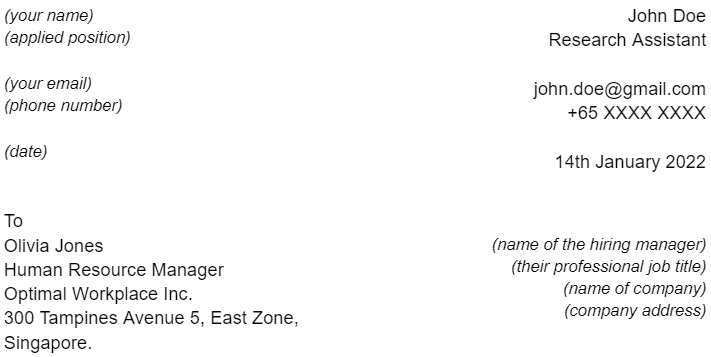
Time to write a killer opening statement! But, do remember to use the proper salutation to address the hiring manager:
Write a compelling but brief introduction on your tertiary education. Then, explain why you’d be the ideal candidate for the job position:
Juice your letter with relevant skills, by mentioning your qualities as well as experience, and elaborate how these could benefit the company. You could mention any volunteer work, extra credit assignments, or other roles that are closely related to the position throughout your study.
Sell yourself by highlighting your achievements; it’s okay to be a little bit extra and create an impressive list of what you have achieved throughout your years of dedicated study!
Add a powerful final closing statement so that you finish strong. Write a realistic promise statement on how you could add value to the company. Add a complimentary close along with your name and signature at the bottom.
Remember to:
Now that you know what to write, let’s check out what NOT to write.
1) Including your personal links on your cover letter
2) Focusing on previous job/internship responsibilities instead of achievements
3) Discussing your salary expectations
Read more: How to negotiate starting salary when you’re a new graduate
We’ve covered the cover letters. Now it’s time to polish your resume so you’d be an even more ideal candidate!

The best format for a fresh graduate is functional or skills-based. Adopting this into your resume enables you to highlight your abilities and skills, rather than your experiences. Here’s a quick run through:
Here’s a tip for you!
Identify the key skills that employers have listed on their job ad. Then match those skills into your resume summary or objective. This would make you an ideal candidate for the specific role!
Unless you’ve accomplished a close to 4.0 GPA, skip listing it on your resume. Also, avoid including high school diplomas since it’s no longer relevant. Follow this structure accordingly:
If you really want to stand out, consider removing your internship or relevant responsibilities, and replacing them with achievements at work instead. Simply use a power verb whenever possible such as “Accomplished, successfully, and/or effectively’. This will make you a more desirable candidate.

1) Customise each cover letter for different job applications
2) Use a professional font that is clear and legible
3) Rename and save your files properly with your nameHiring managers receive hundreds and thousands of job applications daily. If you don’t rename your file properly, it may be difficult for them to track your files.
4) Be honest on everything that you mention about yourself
Almost always, your employers would run a background search on you and will definitely find out if you ever deceive them on your job application

Fully utilising this extensive guide will provide you with a better chance at winning a sweet spot at your dream job. Remember to bring something extra to the table, such as a unique skill set, volunteering work and courses or certifications. Doing this will make you stand out among the other candidates.
Here’s are the summarised infographics you can easily refer to when writing cover letters or revamping your resume:
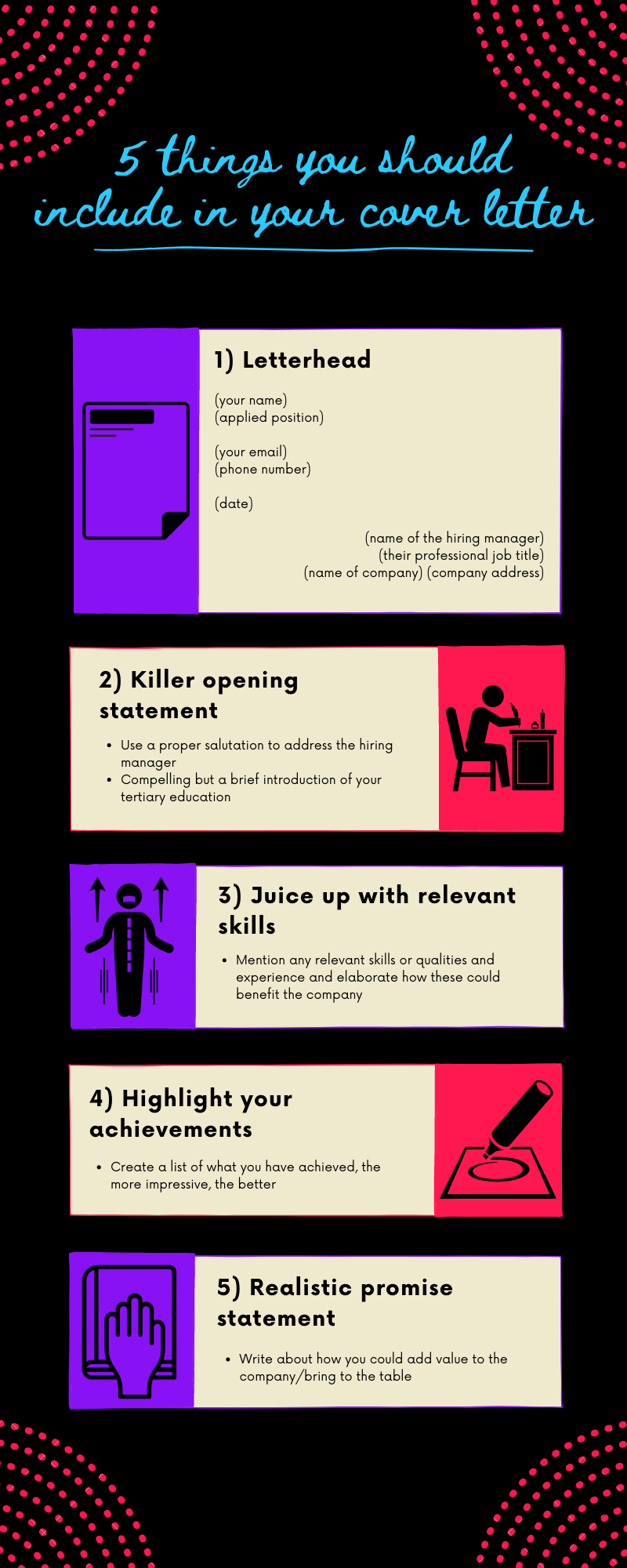
Extra notes:
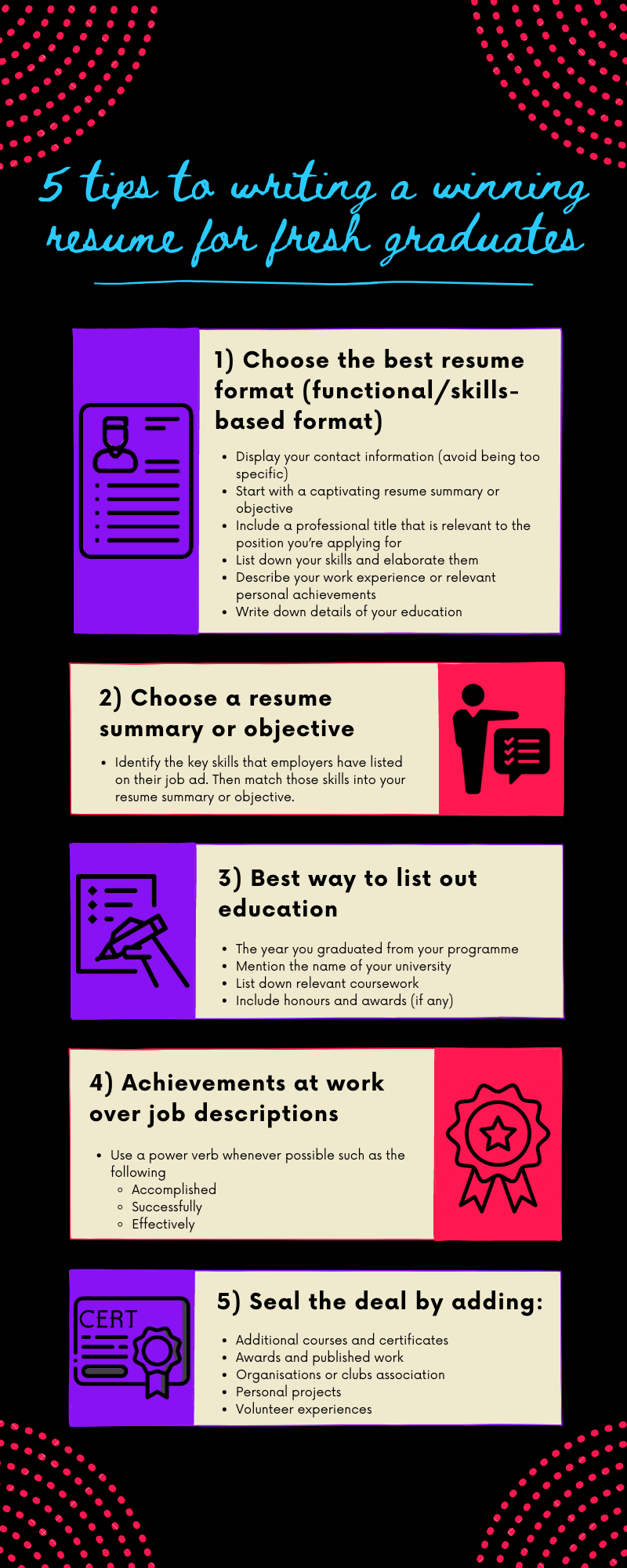
Final tips:
All the best, and may you get that job you’ve always dreamed of!

After all the hard work of writing up your resume to sending in applications, you’ve finally secured yourself an interview for your dream job. We know that you’re thrilled about that job interview, but wait, that’s not yet the end of your struggles!
Having an interview means having the chance to present yourself as perfectly as possible, to impress your interviewers. And you’re here reading this because you want to be well-prepared for the upcoming meeting. Well, you’ve come to the right place!
These days, interviews come in many forms ranging from phone calls, face-to-face meet-ups, video or online interviews, and more. However, regardless of the types available, the things you need to prepare don’t change.
Every hiring post comes with a job description. And this job description posted by the employers can help serve as a guideline to prepare for your interview. Why? Because it’ll list out the qualities, background, skills, and qualifications the employer is looking for when hiring candidates.
The questions asked by the interviewer will usually be related to the job description, and the more boxes you tick concerning the description, the more ideal you are as a suitable candidate.
As an employer, it’s normal to assume that the candidates who have applied for the position would have taken the time to know more about the company. Thus, your interviewer will most likely try to find out how much you know about the company.
Some of the things they could ask would be who the competitors are, what’s the nature of the industry, as well as what’s the best way for them to move forward are among some of the questions. This is why researching the industry and the company you’ve applied to is important.

Going to an interview can sometimes feel like pitching a sale on yourself to your potential employers. So, it’s always good to have at least five key selling points up your sleeves to show that you’re a high calibre candidate. For starters, you can prepare a few scenarios to demonstrate the soft and hard skills that you possess.
As interviewers find candidates who show a keen interest in the hiring position to be more attractive, you should definitely come prepared with a well-rehearsed answer about why you want that job. The answers you’re preparing should address your interests in the job, how you hope to grow with the company, and the skills you have that make you a good fit.
Most employers hire an individual through the elimination process. Since there will always be more candidates in comparison to the availability of job openings, interviewers are constantly looking for candidates’ flaws to screen them out.
So, why not try to put yourself in their shoes and ask why they might not hire you? Through that, you’ll get to identify what weaknesses you have that might get you eliminated, and be well-prepared to smoothly (but politely!) counter any possible questioning.
Most of the time, candidates tend to focus too much on interview questions related to the job and the company. They then forget to be prepared for some common questions, which makes them at a loss for words because they’re caught off-guard.
While it’s hard for you to predict every question that the interviewer could possibly ask, there are always a few that have never failed to be asked during an interview. These common questions include:
The questions mentioned above are just the tip of the iceberg. There are plenty of other common questions that an employer will ask the interviewee, and you should definitely plan carefully thought-out answers for them so that you don’t accidentally trip on your words during the interview!

More often than not, having no question to ask during your interview process when you’re given the chance to do so may reflect on your lack of interest in the job or the company, even if you don’t mean it that way.
This is why it’ll be best to prepare some great questions to ask your interviewers. Having some on hand to ask will show your interviewers that you’re not taking the session (and their time!) lightly.
Did you know that most interviewers already make up their minds about the candidate in front of them after just 5 minutes into the interview? They just spend the rest of the interview looking for details to confirm their decision.
This means that the first few things you’re going to express about yourself will be very important. So, better make the most out of the “Tell me about yourself” question when you’re given the opportunity to.
It’s essential to have a few hard copies of your resume and portfolio to support your statements when you’re attending an interview. While reading through your resume, ensure there are zero grammatical and/or spelling mistakes.
It’ll be wise to rehearse the explanations about your past experiences and how the skills you’ve picked up can contribute to the hiring company. This way, you can reassure your future employers that you’re not only listing out skills on your resume based on their job descriptions.
Behavioural interview questions seem to be the trend among most interviewers these days. They would ask the candidate to describe any past experiences they’ve had that would be a good indicator of their behaviours.
You might be asked to describe any unpleasant experience you’ve had with your ex-bosses, a time when you’ve had to make an unpopular decision, or even how you’ll handle pressure and make choices with limited information.
It’s always a good practice to show your appreciation after an interview. So, write a thank-you email after every meet-up, and customise your content to note the things you’ve talked about or discussed during the interview.

There are many ways for a candidate to leave a strong impression on the interviewers. However, below are a few of the usual things interviewers look out for when interviewing the candidate.
Arriving late to an interview is never an option, as it’ll leave a bad first impression on your potential employers. So, make sure to always arrive at least 20 minutes early before the session starts.
Most interviewers appreciate a firm handshake before and after the session. You’ll also give a strong first impression if you’re sitting straight without slouching/leaning on your chair or the desk. And make sure to come across as attentive to what your interviewers have to say, by maintaining eye contact.
Once you’ve arrived at the interview, remember to always be polite and professional to any of the staff you meet before and after the interview. During the interview, you should answer all questions with a positive statement to show your enthusiasm for the job. Most importantly? Try not to tense up too much before an interview, as it may cause you to come across as cold and aloof, or extremely nervous.
Answering all the questions in a clear and concise manner not only shows your interviewers that you’re confident, but it also shows that you have excellent communication skills. If you’re faced with a tricky question, don’t hit that panic button! It’s perfectly alright for you to pause and think before proceeding with the answer; it shows that you don’t jump headfirst into any situation without careful consideration.
A good resume or CV can only help secure you a ticket for a job interview. What’s important is the impression you portray by the way you perform during an interview that will set you apart from the rest of the candidates, and land you the job you’ve always dreamed of.

If you’re looking to put yourself back on the market to search for a new job, successful job hunting tips are required! Merely sending in your resume to countless job applications wouldn’t get you anywhere close to securing a job, unless you have the proper strategies and techniques.
Job hunting involves more than just submitting documents, searching for open positions, and applying to them. Your application needs to have a certain attractive factor that will grab the hiring manager’s attention.
And it doesn’t stop there. What happens if you’re scheduled for an interview? What should you do then? Don’t worry, we’ve already prepared 10 job hunting tips to help you land your dream job.
If you’re about to enter the job-seeking market or are changing careers, you should identify the type to which you’ll want to stick to. By having a clear, realistic career goal, you’ll be able to plan out the necessary steps required to achieve it in the given timeframe, and it also helps you find what you’re passionate about!
If you’re wondering why there’s no response to your job applications from the hiring managers, it could probably be because of the resume you’ve submitted. One of the things the hiring managers take note of in the initial stage, is the look of your resume. You shouldn’t be surprised if some of them literally judge your resume by its cover.
A resume that’s too wordy, cramped, or cluttered will generally be left out, even if you’ve written lots of relevant information. So, what should you do? Simple. Download an already neatly-crafted resume template! Not only are they free, but they’re also effortless to customise.

There’s no reason for you to limit yourself to only social media or Google search results when it comes to finding jobs. There are tonnes of other resources available such as career fairs, job boards, newspapers, and even online recruitment platforms such as GRIT, which specialises in sourcing the best talent for high-quality roles with the best companies. With the help of GRIT, you’ll get yourself that perfect job in no time.
As you’re looking through the job listings relevant to your interests, it’s best for you to research the companies and the industries they’re in. It’s important to know about the culture of the companies, their current position in the market, what products or services they sell, how the work environments are, and how each company varies in terms of benefits and salary range. Understanding these few things will give you a good idea of what they’re expecting of you, and what you can expect from them in return.
It doesn’t matter if you’re a fresh graduate or a candidate with years of job experience, sending in a general resume to various job openings isn’t the way to go. One of the best ways to increase your chances of getting an interview is to tailor your resume based on the job description.
It really does make a difference when your resume spells out the desired skills and experiences you have that are relevant to the role. You should also include some sub-sections such as your education, contact information, as well as a person of reference in your resume.

Nowadays,when everything we do is related to social media and technology, having an online portfolio to build your presence will increase the chances of employers noticing you, and sometimes, it may also lead headhunters to come looking for you.
There are a few ways to showcase your expertise and passion online. The first and most simple way is through LinkedIn. Think of it as Facebook, but for professional settings. Many employers are now using LinkedIn to check on potential candidates to see what they’re up to in their professional lives.
Another method is to have a customised web page about you. Sounds a little narcissistic? Not at all! Having a web page to showcase your work is a sign that you’re proud of your accomplishments and are not afraid to share with the world, which will come across as being confident to your potential employers.
Having a solid network of contacts while you’re walking along your career path can result in more job opportunities. The more people you know, the more you’ll uncover job leads, and this is precisely why networking is so vital to the success of your search.
Having a wide variety of connections allows you to ask around to get an idea of the trend in the job market, and how you can be more strategic in your job search. You shouldn’t limit your network of contacts to the people you know. It would help if you also connect with people on online platforms such as LinkedIn.

Maintaining a good relationship with your co-workers, managers, as well as your immediate supervisors would help smoothen your career path in the long run.
Rest assured that your professional attitude towards your colleagues, managers, and bosses wouldn’t go unnoticed. If you’ve been nothing but positive and committed to your current job, we’re sure that your managers would gladly write up a glowing reference letter for your future endeavours.
Having to go through so many interviewees for one job opening would tire anyone out, so isn’t it better if you can present yourself and your past experiences in a manner that really stands out? Yes, interviewers tend to remember engaging stories and examples of your past experiences, over lists of facts!
And if you’re wondering, “How can I do that?” Don’t worry, we’ve got you covered. You can create more engaging job interview experiences by incorporating the STAR method (Situation, Task, Action, and Result) to better tell your stories. What you need to do, is to give the necessary details of the situation, what your responsibilities were, the steps you took, and the outcome at the end.
Incorporate them in your interviews, your resume, and your cover letter. Do that, and you’ll see that the dream job of yours comes calling for you in no time!
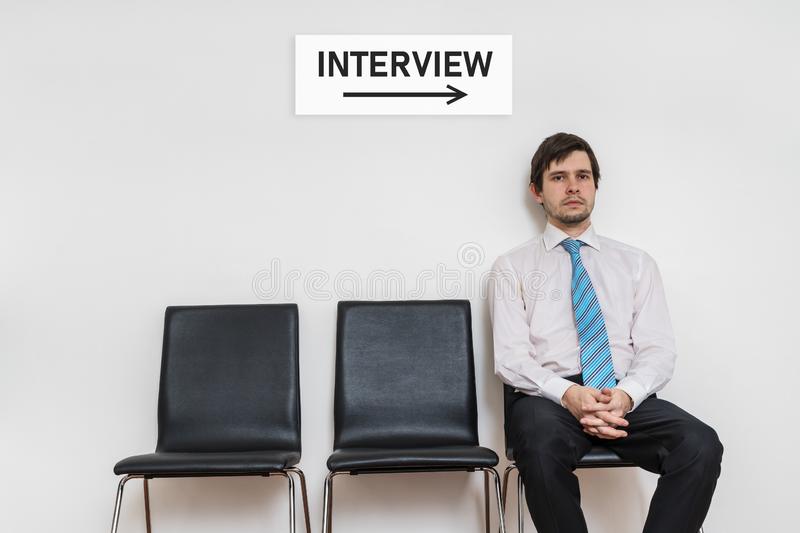
After all the hard work in customising your resume, which then got you the meeting with the potential employer, all you need to do is nail that interview of yours, and you’ll have the job! But things are always easier said than done. This is why it’s crucial to prep yourself for an interview.
How? By doing research: Start with the company, their products and services, their achievements, and what they’ve been up to recently so that you can pre-anticipate the questions that may be asked during the interview.
You should also prep some answers for common questions that’ll be asked during an interview. If you’re ready for it, you’ll be more confident and comfortable going into the interview. Try asking a friend to have a practice run with you, and you’ll find yourself stuttering less in the actual interview.
Remember, interviewers always want to know what you can offer to the company first, in order to determine your worth. After establishing that, they would be able to discuss with you what benefits you stand to gain. But before you can show them who’s the boss, you must demonstrate your skills and reasons for why they should hire you.

There are many ways to apply for a job nowadays. We’re sure you already know by now that usually, all you need to do is to click ‘submit job application’ through an online hiring platform.
Now, what makes an email so important in this process? In general, a job application email’s goal is to show your hiring manager that you’re a good fit for their opening position. The email will highlight any experience, talents, and skills you have relevant to the job. In other words, a job application email is more or less like a cover letter.
If you don’t already know, writing a job application email even after applying through an online hiring platform will let the hiring manager know that you’re keen to work with them. That email also serves as the first impression you provide to the hiring managers.
Hence, it’s important to ensure that it is written in a professional manner and without any grammatical errors. Writing a well-crafted application email will most likely increase your chances of being shortlisted as their potential candidate.
If you’re serious about getting the job, a cover letter is often necessary. Cover letters are basically pamphlets to sell yourself to potential employers, explaining why you’re the best candidate for the role. A job application email only briefly describes your relevant experience and skills, while an effective cover letter fully describes your experience and skills with relevant examples.
As always, a resume is often necessary when you’re applying for a job. That’s because aside from highlighting the experience and skills you’ve already mentioned in your application email, a resume further displays some other top qualities, including the soft and hard skills you have. Having a resume will help your employers make better hiring decisions, and not sending one might just show that you’re disinterested, and reflect unprofessionalism in your email.
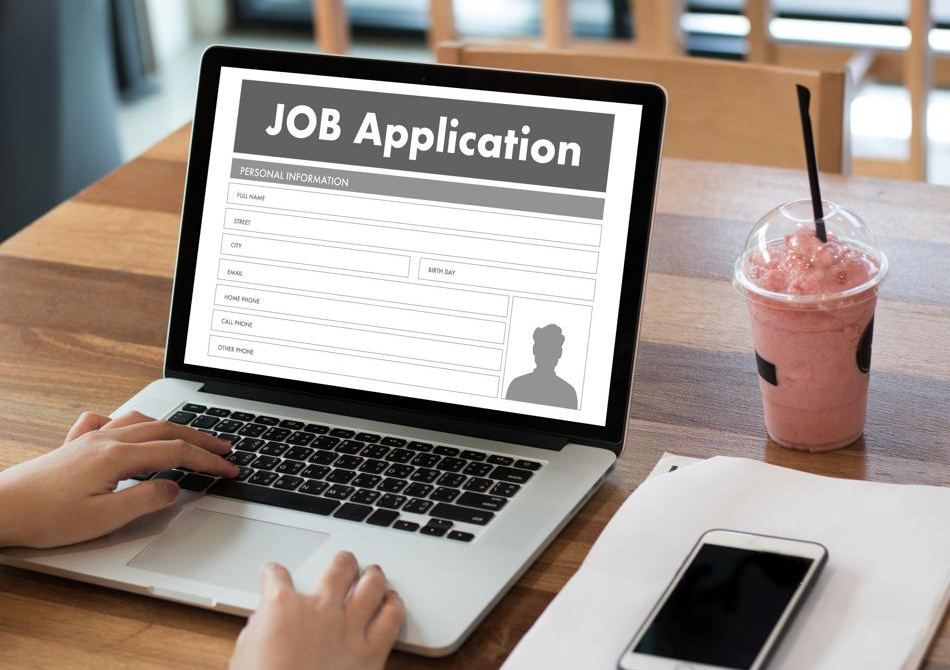
A good subject line is important when sending an application email because it will help your hiring manager decide if they should open or ignore your email. Since hiring managers probably receive tonnes of emails and applications on a daily basis, it’s best to use a short subject line that’s straight to the point to make their job easier.
In the opening line of your email, it’s essential for you to explain who you are, the position you’re interested in applying for, and how you came about the job position. Mentioning all these details allows your hiring managers to understand the purpose of your email, and it also gives them the data about how you found out about the job, which may be beneficial for them.
As for the body paragraph, you should highlight and pitch to the hiring manager why you’re the best possible candidate for the role in their company. If you haven’t got the slightest idea on how to start your writing, try to answer these questions below to kick start your paragraph:
– What is the hiring manager looking for in a candidate?
– What values can you offer to the company?
– What are the most relevant jobs and responsibilities you’ve had in this role?
It will also help if you check out the role’s job description and tailor your job application email according to the description. However, make sure you do not copy or include any part of your resume and cover letter directly onto your application email.
In the ending paragraph, it would be nice if you took the opportunity to thank the hiring manager for taking the time to read your email. It would be best if you also mentioned that your resume and cover letter are attached in the email. Upon ending the paragraph, it’s best to ask how long the application process will take as well as state when and how you will follow up with them.
Last but not least, you should include your email signature, along with your contact details such as your number and email address, in which they could contact you with ease.
Subject: Application for a Software Engineer Position
Dear [hiring manager’s name],
Greetings. My name is [your name], and I hope this email finds you well. I’m writing this to apply for the software engineer position at [company name], which you have posted on [where you saw the job opening position].
I have [number of years] of software development experience, and I specialise in [hard skills that you have] in [your current/past company]. As their software engineer, I have undertaken and completed 4 software projects, and as shown in my resume, the most notable campaign that I’ve managed is [your most successful project]. I’ve also worked as a marketing leader for the application, in which I’ve successfully helped gain 60,000 users.
I would be honoured if I could help contribute to your start-up in shaping your vision and mission in the software development industry.
The attached files include my resume and cover letter. If you have any further questions, do not hesitate to contact me via email or mobile at [your mobile number].
Thank you for considering my application. I look forward to hearing from you again!
Best regards[Your name]

Subject: Application for a Digital Marketing Position
Dear [hiring manager’s name],
Greetings. My name is [your name], and I hope this email finds you well. I’m writing this to apply for the digital marketing position at [company name] you have posted on [where you saw the job opening position].
As shown in my resume, I’m a journalist-turned-digital marketer specialising in online content creation, video production, content distribution, and copywriting. I’ve led and supervised many successful marketing campaigns under [your current/past company]. I also demonstrate excellent creativity in my videos and articles production, as can be seen here [provide some links or portfolio if possible].
With my experience, skills, and expertise in digital media and marketing, I’m confident that I can help grow the [company name] ’s readership and media engagement rate.
The attached files include my resume, cover letter and portfolio. If you require more information, do not hesitate to contact me via email or mobile at [your mobile number].
Thank you for considering my application. I look forward to hearing from you again!
Best regards[Your name]
Ready to blast that carefully crafted email out to all the potential employers, and let your words do the talking into securing an interview for you? Just don’t forget to be as prepared as possible for the actual session itself, by researching as much about the company and the job scope as possible, in addition to learning the 5 Tips On How To Introduce Yourself, While Dazzling Your Interviewer!

A resume objective (also known as the career objective) is a one-to-two line statement that describes your career intent, your professional goals, as well as the reasons why you’re looking for employment.
So, why does something like that matter? Well, that’s because an eye-catching resume objective that highlights your professional skills, experiences, and achievements would help make your resume stand out in addition to explaining why you’re a right fit for the position!
Including a resume objective helps, especially if you’re a fresh graduate with little to no experience prior to entering the job market. If this is the case, including a career objective helps outline your career plans, allowing hiring managers to see how you align with their available openings.
If you’ve decided to make a change in your career path, having such a statement helps clarify your goals and reasons as to why you’re making the switch.
If you’re planning to relocate to a new city, area, or country, noting your plans in your career objective will alert your hiring managers that you’re serious about moving out of town. If your goals are highlighted in a clear and precise manner, it will help you to avoid being disqualified for the job, solely because you’re living out-of-town.
Most employers are looking to hire candidates who are qualified for the job based on its description. Hence, you’re undoubtedly going to do well if your resume objective is one that has been tailored according to the job you’re applying for. When you clearly state the kind of career you’re pursuing, as well as the skills and experiences that you have to support your job, it will undoubtedly catch the eyes of your potential employers.
When you’re writing your resume objective, it’s best to emphasise the specific skills and experiences you possess that have a high correlation with the job. The more detailed and concise you are in your objective, the higher the chance your potential employer will consider hiring you.
Aside from the skills and past experiences you have related to the job, it would be advantageous if you also considered highlighting your overall strengths as an individual (both the soft and hard skills). For starters, if you’re a highly organised person, you should consider describing that attribute about yourself in your resume objective. Listing down any professional licenses, certifications, or awards would also help tell your employers that you’re not limited to the job itself, and that you’re very versatile in assisting your company as a whole regardless of your role.
Hiring managers care about what you can provide for them, more than what you want to get out of their company. It should be clear by now that when it comes to getting the job, your priority is to focus on how you can add value to the organisation you’re applying to. So, consider listing down your ambitions, work ethics, history of successes, and skills with explanations on how these things can bring value to their company.
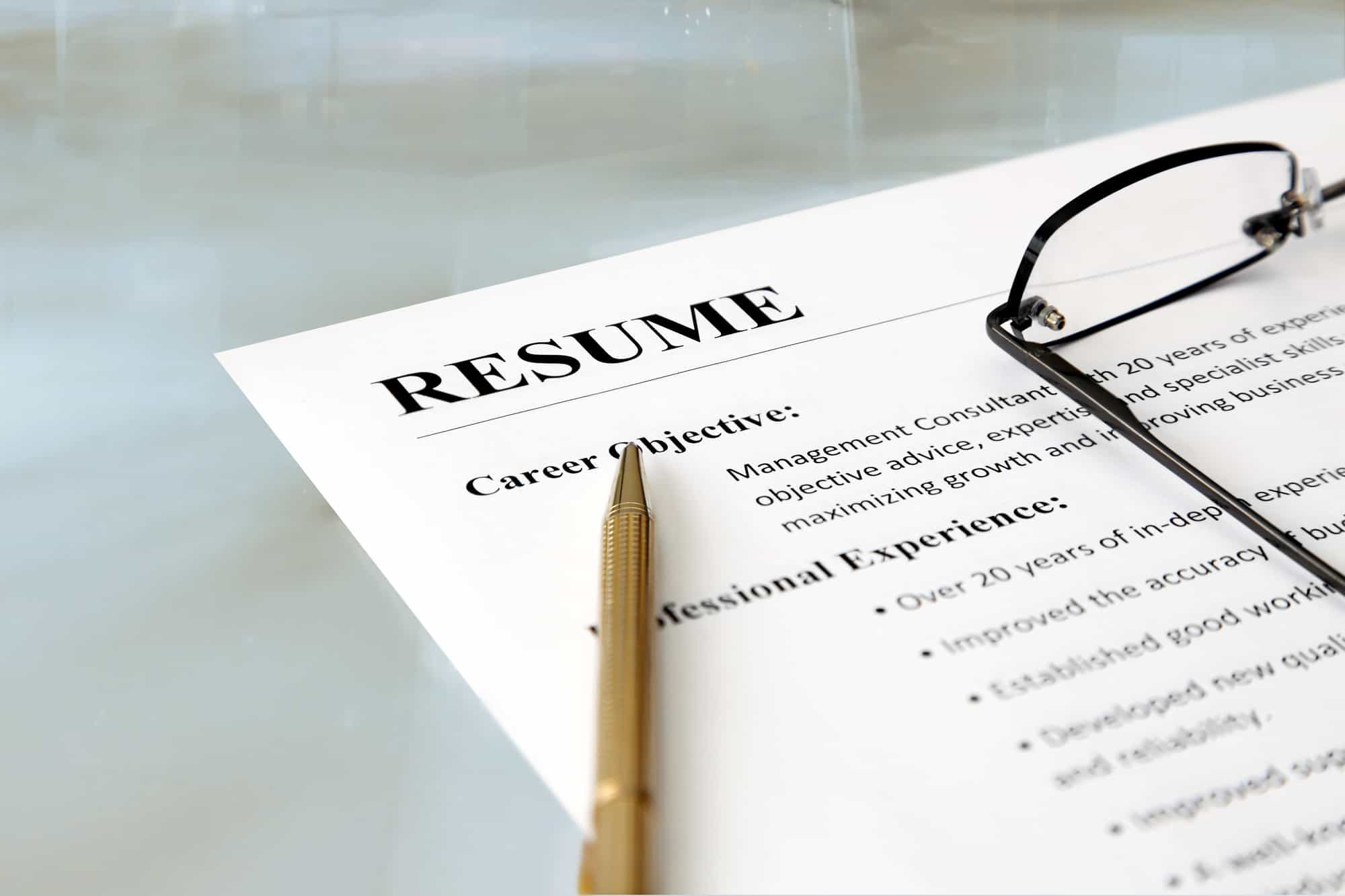
If you’re new to writing down your resume objective statement, don’t worry, we’ve sorted out some examples for you to refer to!
“A highly motivated fresh graduate from [name of university/college], seeking a full-time position in [your field of expertise] where my knowledge of market analytic skills will be able to contribute to improving your organisation’s profitability.”
“A highly driven and motivated team player with proven communication skills, seeking to grow my knowledge of the [your field of expertise] industry as a [desired position] for your [industry’s name] company.”
“A well-organised and disciplined graduate from [name of university/college] with great communication, problem-solving skills, and excellent academic achievements seeking to grow alongside your company in [industry’s name].”
“An accomplished individual with great leadership and market communication skills, seeking a new career path with [name of the new company]. Currently looking for an opportunity to apply my passion for [the new desired position] and professional experience in hopes to contribute to the community.”
“A dedicated and experienced individual in [your current field of expertise], with proven success in managing [past-projects] for a mid-size commercial organisation seeking for an opportunity to use my past experiences to serve the [desired industry] company.”
“An accomplished [your current field of expertise] individual seeking to apply my decade of experience, along with the leadership and communication skills I’ve built up in the [the new desired industry] to ensure further expansion of your company.”
“Experienced [current position] relocating to [new location] in [the month that you’re relocating] and am currently seeking new employment with an expanding start-up. With my [number of years] experience in [your current industry], I believe I can help grow your start-up at a fast pace.”
“A [current position] with more than [number of years] experience in [your current industry] seeking to begin as a [current position/new position] when I relocate to [new location] in [the month that you’re relocating]. I’m eager to apply my skills and experience as a part of an established company.”
“A dedicated leader in the field of [your current industry] seeking for an opportunity to apply my [list of hard and soft skills] to help establish a start-up company. I bring more than [number of years] of experience in [your current industry].”
“Organised and driven [current position] with more than [number of years] experience in the [current industry] seeking for an opportunity to apply my management and leadership skills as an [advancement position] in your fast-growing company.”
“An ambitious professional with a proven track record at increasing the number of sales in the [current business industry], I am currently seeking a position as a [advancement position] with a fast-growing [industry’s name] company where I can apply my sales strategies and management skills to grow your company’s profitability further.”
“As a [current position] with nearly [number of years] of experience in the [current industry], I am seeking the opportunity to serve as a [advancement position] in an established organisation. I’m eager to apply my leadership and team management skills to continue the [desired company’s vision and mission] and help contribute to the company’s future success.”

Below are just some examples of resume objectives that have been tailored specifically to a particular job role, so that you can have an idea of what to write for yours:
“A knowledgeable software engineer with extensive coding and computer programming, as well as object-oriented designing experiences looking to obtain a position that allows me to fully utilise my communication, quick thinking, and problem-solving skills that meets all the goals and objectives outlined by the clients.”
“A member of the management team with 10 years of experience in managing the entire product development process in an established organisation, currently seeking an opportunity to integrate my development strategies to expand your company.”
“A dedicated and skilled individual with nearly 8 years of managing experience in the direct sales department. Currently seeking a position that allows me to apply my developmental, brand portfolio production, organisation, communication, and leadership skills when interacting with internal teams and clients.”
“An enthusiastic marketing graduate with a passion for graphic designing and copywriting seeking a digital marketing executive position at a relevant company. Previous projects from university years include garnering up to 8,000+ likes for the club’s Facebook, as well as 5,000+ followers on our Instagram account.”
“A results-driven business development team leader with more than 5 years of professional experience in development management, channel management, as well as change implementation. Currently seeking a position as a Business Development Manager to lead a team of salespeople to increase the sale of your products and services.”
“A business student graduate from the name of your university] seeking an opportunity to work as a business analyst at a start-up. Proven to have good academic qualifications, I’ve also successfully consulted more than 10 real-life business cases from my internship at [name of the internship company].
“A highly organised individual with strong interpersonal and communication skills who can help handle and build relationships as well as influence stakeholders. With a total of 5 years experience in managing and developing an organisation’s social media coverage and creating content to optimise community engagement levels, I’m currently looking for an opportunity in a community manager position.”
“An approachable, dedicated, and hardworking human resources coordinator with good interpersonal and communication skills seeking a position as an HR manager. I have a total of 4 years of experience in managing and implementing strategies to improve employees’ satisfaction and work performances.”
Want your resume to make a good first impression on your behalf so that the interviewer’s interest will be piqued, and you’ll score that coveted face-to-face session? Then here’s your chance to shine, and make sure that your words pave your way right up to the interviewer’s desk!